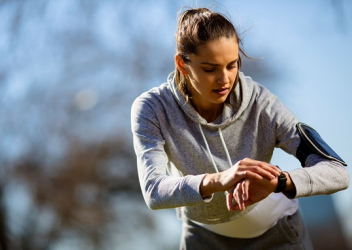Concussion Recovery App: Ecological Momentary Assessment
As a research method, Ecological Momentary Assessment (EMA) to track symptoms of concussion involves repeated sampling of subjects' current behaviors and experiences in real time, in subjects' natural environments. EMA aims to minimize recall bias, maximize ecological validity, and allow study of microprocesses that influence behavior in real-world contexts.
In collaboration with Douglas Wiebe, PhD at Penn’s Center for Clinical Epidemiology and Biostatistics, the Minds Matter team has evaluated a concussion recovery app, termed RECOUPS, that was designed to help patients and clinicians assess cognitive and physical activity as well as concussion symptoms in real-time during recovery from pediatric concussion.
As a research strategy, the research team found that EMA can capture objective measures of physical activity, reports of cognitive activity, and symptomatology in real time in pediatric patients. In addition, EMA holds the promise of helping clinicians monitor their patients’ recovery in real-time and adjust care plans accordingly, rather than waiting for follow-up visits and relying on remote patient and parent recall. This collaboration continues to use RECOUPS and EMA.
Project Details
- Ecologic Momentary Assessment to Accomplish Real-Time Capture of Symptom Progression and the Physical and Cognitive Activities of Patients Daily Following Concussion
-
RECOUPS-ED
While our pilot work demonstrated the feasibility of using this approach among a group of concussed youth enrolled from our specialty clinics, we still need to identify the optimal way to ensure adherence to the digital monitoring utilized with RECOUPS in a broader population enrolled shortly after their injuries. To that end, we currently are conducting a randomized trial out of the emergency department of several incentivization strategies, to establish the method that maximizes compliance. In addition, by only enrolling youth shortly after the injury, this study will begin to describe the relationship between activity and symptoms on a granular level during the critical first few days after injury.
EMA is being used in our study of objective assessments of concussion to complement a suite of quantitative assessment tools. RECOUPS is being used by both concussed youth to monitor symptoms, activity, and sleep on daily basis over a several week post-injury period. For comparison, this assessment is also being used in an uninjured comparison group to understand the variability of these measures in healthy adolescents.
Exercise Therapy Post-Concussion
In order to closely monitor the effects of exercise as an acute therapy, study participants are using the RECOUPS app to report daily symptoms. Clinical study staff monitor this data to understand the effects of the intervention of concussion symptoms and activity.
Evaluation of RECOUPS
In our first study to evaluate ecologic momentary assessment following youth concussion, 34 patients wore an accelerometer and carried an iPod Touch®. In this sample 82% of patients responded to 80% of iPod prompts to log activity and symptoms in real time. The research team found that cognitive rest and higher physical activity were associated with lower symptom scores.
Research Team (CHOP): Christina L. Master, MD; Michael L. Nance, MD; Eileen Houseknecht, RN; Matthew Grady, MD; Research Team (Penn): Douglas Wiebe, PhD; Nicole Otto, MD; Danielle Sandsmark, MD
Funding: Penn National Translational Neuroscience Center




